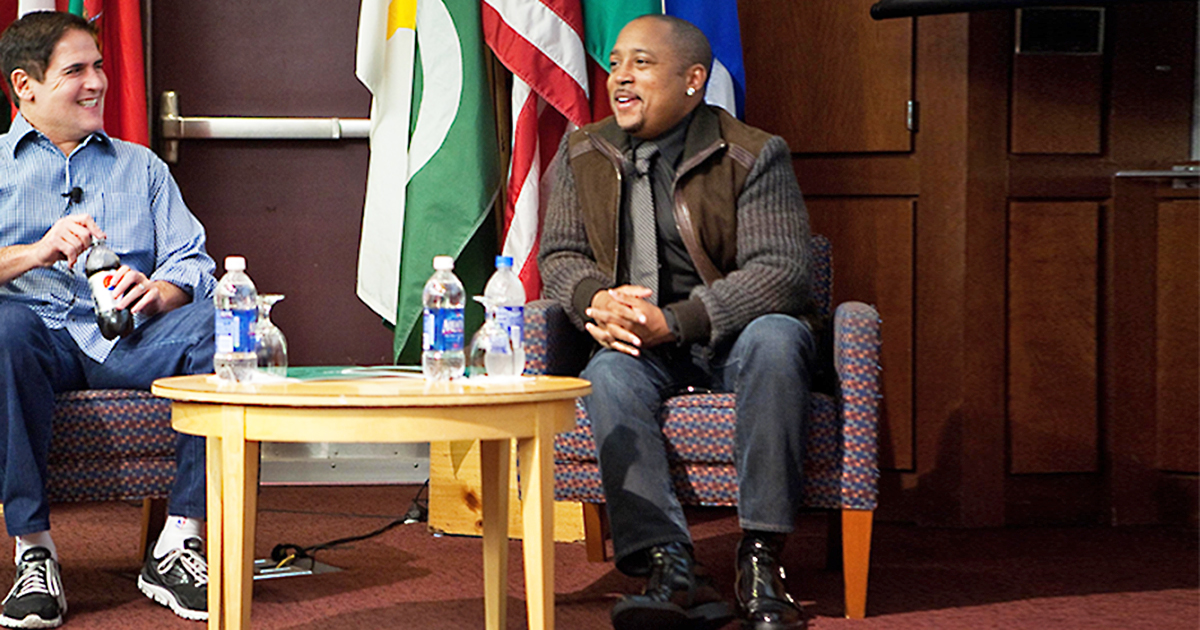Swimming With The Sharks

For an entrepreneur, what could be better than pitching your business to five well-connected, deep-pocketed investors?
How about pitching to those investors on prime-time television for an audience of 8 million potential customers? The popular ABC reality show Shark Tank has introduced viewers to more than 450 businesses since its 2009 premiere.
Practice, Practice, Practice
Sanjiv Patel pitched his specialty peanut brand, Lord Nut Levington, during season 5. He’d watched the show pick up steam over the years and toyed with the idea of auditioning, but was hesitant about being on such a big stage.
“I pushed myself because I knew it could be a good opportunity for my business,” he says.
Keeping the secret from friends and family was one of the tough parts. “People kept telling me I should go on the show or asking why I hadn’t tried, and I’d just nod my head as though it had never crossed my mind.”
For some, the big break comes at open casting calls and auditions. Others, like sock company Bombas, are discovered on crowdfunding sites like Indiegogo or Kickstarter. Bombas co-founder and CEO David Heath sees advantages to this approach: companies can prove that there’s demand for their products, and at the same time the crowdfunding videos give the show’s producers a preview of how well the entrepreneurs would do on camera.
Either way, entrepreneurs spend countless hours rehearsing before pitching in front of the sharks. Patel downloaded every episode of the show onto his iPad and watched each one to help prepare. Similarly, the Bombas team watched past episodes and practiced answers to 200 of the sharks’ standard questions until their answers were flawless.
Jamie Siminoff, chief inventor of Ring, a video doorbell you access via smartphone, assembled a mock set in his backyard where he practiced for a month. “I set up chairs where the judges would be and had people come over to grill me,” he says.
As he watched past episodes, he flagged the ones where the sharks had caught seemingly smart entrepreneurs in something silly or made them look bad. “Their interest is in making a TV show and entertaining people,” he says, “and my biggest worry was being part of that in a negative way.”
Diving Into the Tank
A 60- or 90-minute in-person pitch gets condensed down to just 10 minutes for TV. The tension and intensity are ratcheted up as the show is edited, but Heath revealed that in person, the sharks were warm and approachable. “It’s not as scary as it appears,” he says. “They ask softer questions in the beginning and it’s very conversational so you feel comfortable.”
In Heath’s experience, the segment that aired focused more on the company’s valuation and reaching a deal with a shark vs. Bombas’ mission as a one-for-one company that donates socks to homeless shelters.
“We’re branding and marketing guys and love talking about our product, so I wish the editing had been a little different, but they know what works on TV.”
His advice? “Know your numbers backwards and forwards. And know where you want to end up; you may be able to back your way in.”
Heath and his partners rehearsed scenarios for all the offers or deals they would accept on the show, and they had a clearly defined line in the sand that they knew they wouldn’t cross. Bombas succeeded in getting a deal with Daymond John, giving up 17.5% of their company in exchange for $200,000 from John, who also provided financing for inventory.
Siminoff describes his pitch to the sharks as the hardest single hour of his career. “You’re not just taking questions, you’re also trying to be this witty, entertaining person with smart answers,” he says. He was “beyond nervous” when his episode finally aired, but he felt good about the final outcome. “The edit was very true to the spirit of my taping, just shorter.”
Sharks Feel the Pressure
While the entrepreneurs are in the hot seat, the sharks are under pressure also. “We don’t know anything about the entrepreneurs until the moment they walk in,” says Daymond John. “I love entrepreneurship and I’m in love with almost every idea as soon as it comes out … but I know I’m not the smartest person in the room. I wait for the other sharks to cut it up and sometimes I realize I’d be a moron to invest.”
For those businesses that do walk away with a deal, the journey is just beginning. Many of the verbal agreements from the TV show never close once the due-diligence process begins. “Maybe the person misrepresented themselves, or we didn’t like the person,” says John. In one memorable example, a partnership dissolved when it was discovered that the would-be entrepreneur didn’t believe in income taxes and had never filed a tax return.
Rocking the Boat
Deal or not, the exposure from Shark Tank is a boon for business. On the day the Bombas episode aired, the company’s daily sales numbers skyrocketed 6,000%. Bombas did $1.2 million in sales in just two months following its Shark Tank debut, which Heath describes as both incredible and insane.
“For all of Q4, we didn’t have the bandwidth to do anything other than fulfill orders, get our product out the door, handle customer-service issues, and make sure the website didn’t crash,” he says. “Being on Shark Tank was like being in a rowboat that’s getting hit with huge waves, and we’ve been trying to make sure the water stays out of the boat.”
It’s helped having Daymond John in their corner to provide support. “He’s been an amazing partner—his office is five blocks away and he calls, checks in, and emails us all the time,” says Heath.
Siminoff and his team anticipated a surge of traffic to their website, and were nervous when Ring sales didn’t go up as much as they’d expected on the night the show aired. What if all the time and energy hadn’t been worth it?
“It wound up causing this crazy halo effect for our sales,” he said. “The day after we aired, our sales were higher, and the following day we sold more than the day before. We’ve stayed at that higher level and have done millions of dollars in sales directly because of Shark Tank.”
Patel, whose episode aired last season, has continued to see business benefits for Lord Nut Levington even now that the initial flood of online orders has slowed. He says buyers have brought up his Shark Tank appearance in sales meetings, and it’s given the brand an extra edge.
On a personal level, Patel has been recognized on the street and even had people stop and ask for photos, which Patel describes as “a bit surreal” for a Brit who was working as an accountant just a few years ago. Another surprise has been the sales spike for Lord Nut Levington each time reruns of the episode air, which proves just how powerful the show can be.
Although Patel says there’s been no downside to his participation in the show, there is one lingering catch. “I really do love the show but I can’t watch it anymore,” he says. “Just hearing that theme music—I think it’s become my kryptonite!”
Posted in Entrepreneurial Leadership






